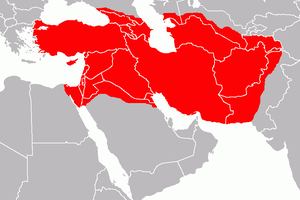- Ninus
-
Ninus (Greek: Νίνος), according to Greek historians writing in the Hellenistic period and later, was accepted as the eponymous founder of Nineveh (also called Νίνου πόλις "city of Ninus" in Greek), Ancient capital of Assyria, although he does not seem to represent any one personage known to modern history, and is more likely a conflation of several real and/or fictional figures of antiquity, as seen to the Greeks through the mists of time.
Many early accomplishments are attributed to him, such as training the first hunting dogs, and taming horses for riding[citation needed]. For this accomplishment, he is sometimes represented in Greek mythology as a centaur.
The figures of King Ninus and Queen Semiramis first appear in the history of Persia written by Ctesias of Cnidus (c. 400 BC), who claimed, as court physician to Artaxerxes II, to have access to the royal historical records.[1] Ctesias' account was later expanded on by Diodorus Siculus. Ninus continued to be mentioned by European historians (e.g. Alfred the Great), even up until knowledge of cuneiform enabled a more precise reconstruction of Assyrian history in the 19th century.
He was said to have been the son of Belus or Bel, a name that may represent a Semitic title such as Ba'al, "lord". According to Castor of Rhodes (apud Syncellus p. 167), his reign lasted 52 years, its commencement falling in 2189 BC according to Ctesias. He was reputed to have conquered the whole of western Asia in 17 years with the help of Ariaeus, king of Arabia, and to have founded the first empire, defeating the legendary kings Barzanes of Armenia (whom he spared) and Pharnus of Medea (whom he had crucified).
As the story goes, Ninus, having conquered all neighboring Asian countries apart from India and Bactriana, then made war on Oxyartes, king of Bactriana, with an army of nearly two million, taking all but the capital, Bactra. During the siege of Bactra, he met Semiramis, the wife of one of his officers, Onnes, whom he took from her husband and married. The fruit of the marriage was Ninyas, said to have succeeded Ninus.
A number of historians, beginning with the Roman Cephalion (c. AD 120) asserted that Ninus' opponent, the king of Bactria, was actually Zoroaster (or first of several to bear this name), rather than Oxyartes.
Ninus was first identified in the Recognitions (part of Clementine literature) with the biblical Nimrod, who, the author says, taught the Persians to worship fire. In many modern interpretations of the Hebrew text of Genesis 10, it is Nimrod, the son of Cush, who founded Nineveh, but this too is ambiguous: other translations (e.g., the KJV) render the same Torah verse as naming Ashur, son of Shem, as the founder of Nineveh.
More recently, the identification in Recognitions of Nimrod with Ninus (and also with Zoroaster, as in Homilies) formed a major part of Alexander Hislop's thesis in the 19th century tract The Two Babylons.
Ctesias (as known from Diodorus) also related that after the death of Ninus, his widow Semiramis, who was accused of causing it, erected to him a temple-tomb, 9 stadia high and 10 stadia broad, near Babylon, where the story of Pyramus and Thisbe (Πύραμος; Θίσβη) was later based. She was further said to have made war on the last remaining independent monarch in Asia, king Stabrobates of India, but was defeated and wounded, abdicating in favour of her son Ninyas.
Shakespeare's A Midsummer Night's Dream has the story of Pyramus and Thisbe as a play-within-a-play. The actors constantly mispronounce the location "Ninus' Tomb" as "Ninny's Tomb," though they are corrected initially, and in vain, by "director" Peter Quince.
The story of Ninus and Semiramis is taken up in a different form in a 1st century AD Hellenistic romance called the Ninus Romance, the Novel of Ninus and Semiramis, or the Ninus Fragments.[2] A scene from it is perhaps depicted in mosaics from Antioch on the Orontes[3]
Another Ninus is described by some authorities[who?] as the last king of Nineveh, successor of Sardanapalus.
Trivia
An NPC is named Ninus in the MMORPG from Funcom, Age of Conan.
Sources
 This article incorporates text from a publication now in the public domain: Chisholm, Hugh, ed (1911). Encyclopædia Britannica (11th ed.). Cambridge University Press.
This article incorporates text from a publication now in the public domain: Chisholm, Hugh, ed (1911). Encyclopædia Britannica (11th ed.). Cambridge University Press.- Full account in Diodorus
- ^ "Like a Bird in a Cage": The Invasion of Sennacherib, Lester L. Grabbe (2003), p. 121-122
- ^ Daphnis and Chloe. Love Romances and Poetical Fragments. Fragments of the Ninus Romance, Loeb Classical Library ISBN 0-674-99076-5
- ^ Doro Levi, "The Novel of Ninus and Semiramis" Proceedings of the American Philosophical Society 87:5, Papers on Archaeology, Ecology, Ethnology, History, Paleontology, Physics, and Physiology (May 5, 1944), pp. 420-428
Categories:- Hellenistic historiography
- Legendary rulers
Wikimedia Foundation. 2010.


